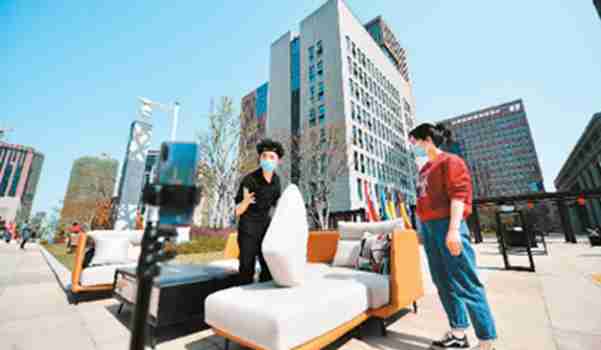

As the novel coronavirus disease (COVID-19) continues to spread around the world, many Chinese cities have recently held online exhibitions to help offset the impact of not being able to hold shows offline.

Photo taken in a cross-border e-commerce industrial park in Nankang district, Ganzhou, east China’s Jiangxi province shows sales clerk promotes furniture via live streaming on mobile phone. (Photo by Hu Chenhuan/Xinhua)
The Beijing online exhibition development alliance has received positive feedback from organizations and enterprises since it was established at the end of last month. Through the alliance’s efforts, three major exhibitions have been held online.
The 2020 Three Gorges Citrus International Fair (Online) was held online from Feb. 16 to March 16, and helped sell more than 270,000 tonnes of citrus fruit, bringing tangible benefits to orchardists and related companies.
Exhibitions are also an important way for foreign trade enterprises to promote their goods overseas. However, due to the pandemic, many overseas exhibitions have had to be put off or canceled.
At a State Council executive meeting held on April 7, it was decided that the 127th China Import and Export Fair (also known as the Canton Fair), will be held online in mid to late June, the first time this has been done in the history of the well-established event.
Made-in-China.com, a website that was established to connect global buyers with Chinese suppliers, has provided new platforms for business negotiations between foreign trade enterprises through virtual online exhibitions.
These platforms enable buyers to gain information about manufacturers’ products from pictures, descriptions, videos, and panoramic photos of factories.
According to an executive from Made-in-China.com, the website saw a 39 percent growth in page views last February on a year-on-year basis, and provided nearly 200,000 pieces of open procurement information for Chinese suppliers.
The website also plans to launch 15 virtual Smart Expos before the end of June, aiming to showcase Chinese products to overseas buyers, the executive revealed.
New technologies such as 5G network, live streaming, and virtual reality (VR) have played a big part in bringing online exhibitions to life.
At the recently held 2020 global textile exhibition, many enterprises successfully made contacts with potential clients via live streaming.
Live streaming has been very effective, according to an executive of a textile company that has used webcasts and live streaming videos to attract clients every day during the exhibition.
According to the executive, each of the company’s products has witnessed around 300 page visits each day, bringing more potential clients to the company.
BOSSGOO.COM, a global online marketing and cross-border e-commerce platform established by a service company based in Ningbo, east China’s Zhejiang province, rolled out a VR application for enterprises during its online exhibitions.
The application allows potential clients to virtually “visit” factories and “try out” products and services.
A number of enterprises, including major Chinese mobile phone makers Xiaomi, Huawei, and Huawei’s sub-brand Honor have turned their offline events for launching new products into online events.
 Fire brigade in Shanghai holds group wedding
Fire brigade in Shanghai holds group wedding Tourists enjoy ice sculptures in Datan Town, north China
Tourists enjoy ice sculptures in Datan Town, north China Sunset scenery of Dayan Pagoda in Xi'an
Sunset scenery of Dayan Pagoda in Xi'an Tourists have fun at scenic spot in Nanlong Town, NW China
Tourists have fun at scenic spot in Nanlong Town, NW China Harbin attracts tourists by making best use of ice in winter
Harbin attracts tourists by making best use of ice in winter In pics: FIS Alpine Ski Women's World Cup Slalom
In pics: FIS Alpine Ski Women's World Cup Slalom Black-necked cranes rest at reservoir in Lhunzhub County, Lhasa
Black-necked cranes rest at reservoir in Lhunzhub County, Lhasa China's FAST telescope will be available to foreign scientists in April
China's FAST telescope will be available to foreign scientists in April "She power" plays indispensable role in poverty alleviation
"She power" plays indispensable role in poverty alleviation Top 10 world news events of People's Daily in 2020
Top 10 world news events of People's Daily in 2020 Top 10 China news events of People's Daily in 2020
Top 10 China news events of People's Daily in 2020 Top 10 media buzzwords of 2020
Top 10 media buzzwords of 2020 Year-ender:10 major tourism stories of 2020
Year-ender:10 major tourism stories of 2020 No interference in Venezuelan issues
No interference in Venezuelan issues
 Biz prepares for trade spat
Biz prepares for trade spat
 Broadcasting Continent
Broadcasting Continent Australia wins Chinese CEOs as US loses
Australia wins Chinese CEOs as US loses